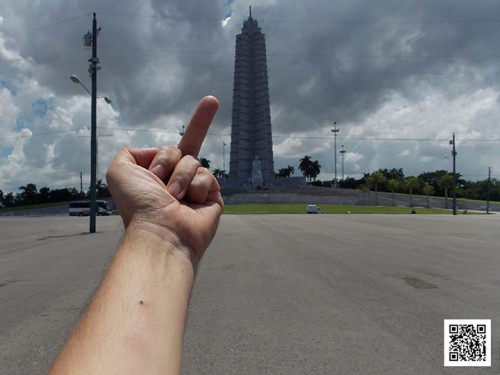Ai Weiwei’s Havana
by Orlando Luis Pardo Lazo and translated by Alex Higson / September 2, 2013 / 1 Comment
In which Cuban state security is terrified of a culture of liberty…
For an outmoded Socialist Revolution like Cuba, which has spent more than half a century in power, a pinch of freedom of information combined with an enormous citizen desire to transform society is an explosive mixture.
In mid-August in Havana, there was an unofficial screening of the documentary Never Sorry, which is about the life and work of the Chinese dissident artist Ai Weiwei. The premiere was held in the private room of Cine a toda costa (Cinema at all costs), a space that functions as an art gallery and independent cinema. It also serves as a home to human rights activists Ailer González and Antonio Rodiles, who promote the filmed debates of the Estado de SATS (State of SATS) project.

- Is it worth-while to focus on the last images and letters coming from the inside of the last living utopia on Earth? Is Cuba by now a contemporary country or just another old-fashioned delusion in the middle of Nowhere-America? A Cold-War Northtalgia maybe? Can we expect a young Rewwwolution.cu within that Ancien Régime still known as The Revolution? I would like to provoke more questions than answers.

- Orlando Luis Pardo Lazo was born in Havana City and still resides and resists there, working as a free-lance writer, photographer and blogger. He is the author of Boring Home (2009) and is the editor of the independent opinion and literary e-zine Voces.
Despite these factors, the degree of police repression conducted around their home that night was unexpected. Dozens of people’s cell phones were blocked, including both organizers and guests of the event. In addition, the police sent fake text messages to attendees, claiming that the show had been canceled due to an emergency, and arrested many of the organizers on streets nearby Ailer and Antonio’s home. In the end only around thirty people managed to enjoy the documentary.
Cuban State Security is obviously terrified of a culture of liberty. The phrase attributed to the Nazi politician Hermann Wilhelm Göring—“When I hear the word culture, I reach for my Browning!”—could just as easily have been uttered by any of the Island’s uniformed or plainclothes officials.
However, brute force cannot push aside the desire for creativity. Just a few days after the screening, one of its organizers, Walfrido López Rodríguez, went out into the Plaza de la Revolución in broad daylight and launched a photographic show inspired by Ai Weiwei’s “Study of Perspective” series. The outraged citizen pitted against the arrogance of power. The individual against the caudillo and his demagoguery.
Now symbols of the establishment in Cuba will be a part of the global history of art fighting against the despotism of one ideological sign or another.






One Comment on "Ai Weiwei’s Havana"
Once again, thank you for denouncing and exposing the dictatorship true colors while most of the world continues to be deaf and blind. I guess a poor and small island is not important enough, or people continue to be enamored of the so called “revolution” which is yet another myth.
My solidarity and respect for “Estado de Sats”. Job well done!
I stand by you and with you OLPL. Always.
AT